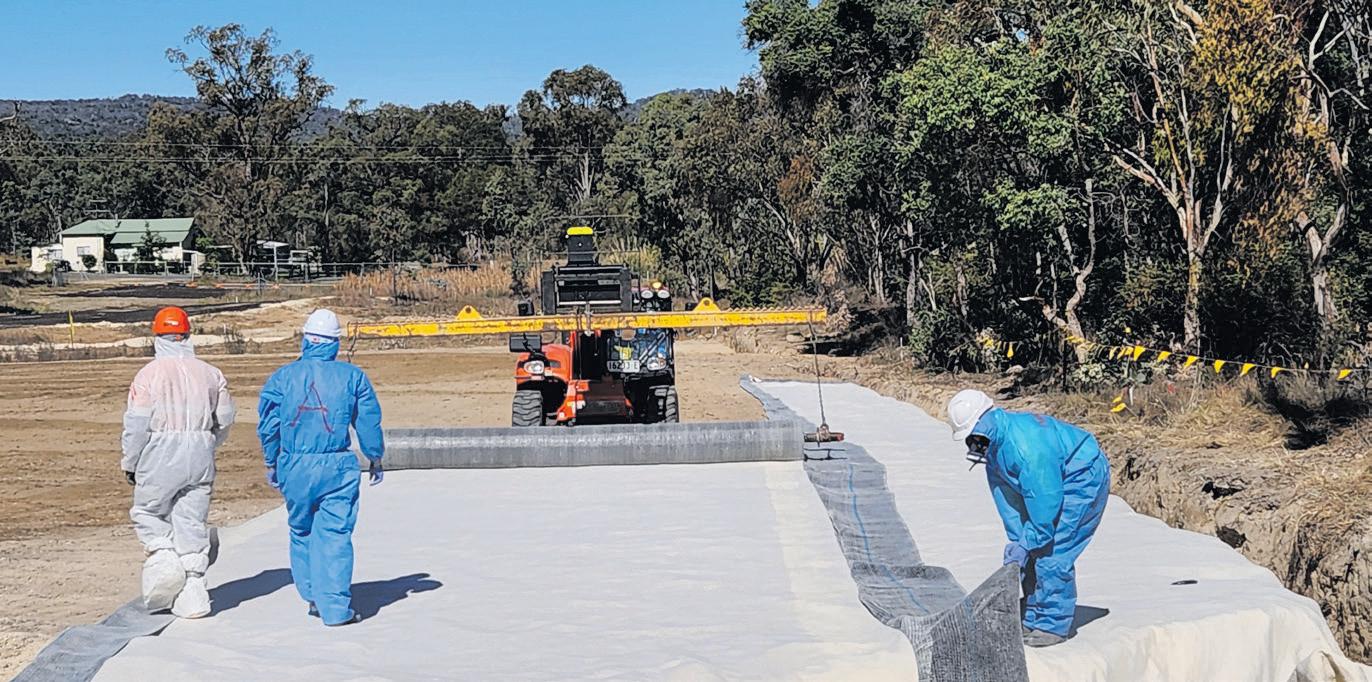
3 minute read
Clean-up completed at former arsenic facility at Tenterfeld
The NSW Government has completed a $3.4 million project to remediate contamination at the former Jennings Processing Plant near Tenterfeld, cleaning up a legacy polluted site almost 100 years since it closed.
The Crown Lands project took place over almost fve months and followed many years of planning to excavate and contain soil contaminated by the former plant, which produced arsenic trioxide powder from 1923 to 1928 to help control the spread of Prickly Pear weed across the state.
About 1,650 tonnes of contaminated soil has been sealed in a containment cell, with the site capped with a geosynthetic clay liner, clean soil, compost and then overlaid with hessian across a 10,500 square metre area larger than a football feld.

The land was then revegetated with a seed mixture, including a combination of 10 native grasses, to create fresh ground cover that will restore the site to a natural state.
The Soil Conservation Service was contracted to undertake the work including measures to protect the area against potential future erosion and sediment run-off.
The clean-up commenced in March under the guidance of Environmental Resources Management Australia and following investigations by Crown Lands, the Environment Protection Authority (EPA) and Tenterfeld Shire Council. A remediation strategy was put in place in accordance with the NSW Contaminated Land Management Act 1997.
Some further minor works will occur, including vacuum cleaning of adjacent rock areas and the planting of trees on surrounding land. The area will be monitored over time to assess the site’s suitability for public access.
Previous remediation works took place at the site in the 1950s, and then in 2009 when topsoil was laid and a basin built to collect contaminated runoff. Find out more about the remediation of the former Jennings Arsenic Plant.
Minister for Lands and Property Steve Kamper said:
“Like many places where historic industrial sites operated, the community at Jennings was left to bear the brunt of contamination from actions that occurred a long time ago.
“The arsenic trioxide produced here may have addressed one problem but left another that has now been fnally dealt with.

“I thank the team at Crown Lands and its partners for cleaning up this land so that it can once again be utilised by local wildlife and the community.”
Member for Lismore Janelle Saffn said:
“This is a wonderful outcome that has taken years of dedicated planning and investigations to address.”
“The work done here hopefully puts to rest contamination concerns that have been at this site for almost a century.
“One day, I hope it can be reused as open space for the local community following ongoing monitoring to ensure there is no further risk of contamination.”
GROW Odd Socks Day - Stamp out Stigma on Friday October 6

Friday October 6 is Odd Socks Day and GROW Australia invites everyone in the Northern Rivers to put on odd socks to help stamp out the stigma surrounding mental health.
Odd Socks Day is a chance to support people experiencing mental health challenges. Mental health affects a signifcant number of Australians, with 4.2 million experiencing them in the last year and 44% experiencing them during their lives.
Wearing Odd Socks on Friday October 6 can start a conversation about mental wellbeing and how everyone can have times when they feel odd or out of sorts.
Odd Socks events held around Australia promote awareness and raise funds for GROW’s peer-to-peer mental wellbeing programs.
In the Northern Rivers, an Odd Socks Day morning tea is happening at Pop Denison Park in Ballina at 10am. Everyone is welcome. Bring a cup and a chair and you are guaranteed to make some new friends. Friendship is the special key to mental health after all.
GROW’s programs offer mutual help and friendship through weekly meetings, helping people improve their mental health by reducing anxiety, increasing self-esteem, and fostering a sense of community. The programs are based on lived experience of what works in recovering and maintaining good mental health, as contributed by the many generations of people who have participated in groups since GROW frst began in 1957. The programs are free and open to everyone over 18.
There are two key strategies to reduce stigma – education and contact. Education brings the understanding that mental health challenges are something we can all experience and gives people confdence to call out stigma when they see it, with friends, family, in the workplace and online. The contactbased approach is about encouraging simple, informal conversations about mental health and the importance of belonging and connectedness for our wellbeing.
To fnd out more about the morning tea on October 6, your local GROW group or other ways you can help stamp out stigma on Odd Socks Day, phone Jo on 0483 888 844 or visit grow.org.au










